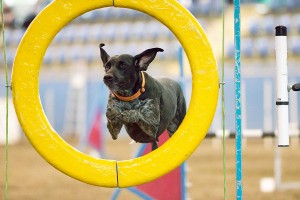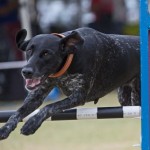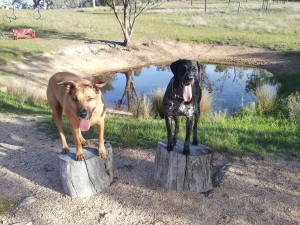I got told a couple of times lately: Shellbe (my German Shorthaired Pointer who I compete in Agility with) really covered you there!
It was in competition or training when I made a mistake and Shellbe did everything she possibly could to make up for it. And she did! Isn’t that what friends are for?

I hear it more often in Agility circles but it probably happens in other competitive sports as well: I am getting my next performance dog! I have to say this makes me cringe.
What does it mean, getting a performance dog? Does it mean the main aspect of the relationship will be the chosen sport? What happens if that does not work out? What does the dog do the rest of the time? Even ‘performance dogs’ only train and compete part time. There are probably 22 hours left in a day where they are ‘just’ pets. Since when have our egos become so big that it is not enough to have fun in Agility or Rally and get the occasional qualification card or even win? But that it needs to be perfect every time, even for the ones who do not train for perfection.
To be honest sometimes I am a bit disillusioned with competitive dog sports. Most of us are doing this as a hobby and not for living. Our dogs did not ask to be there and do Agility, Rally or Obedience. We make them do it! It is our job to make it fun and if we cannot make if fun I think we should have a break or at least take a deep breath.
Dogs are transported to trials all over the place and then spend 7 hours in their crates to just come out for their runs. Fairly predictably they cannot concentrate, run out of the ring or get marched off the start line because they broke the start line-stay. The dog is frustrated, the handler is frustrated and it goes downhill from there.
Or a dog barks or lunges at another dog at a competition, leashes are jerked, dogs are yelled at. This is a highly stressful environment for dogs and handlers and we all suffer from trigger stacking.
This scenario goes along the lines: The first run was bad because there was another dog too close to the ring, someone left a toy or food pouch on the ground, then a competitor yelled at a dog in close vicinity, it is really hot and windy and flies everywhere. Around lunch time the dog has had it and reacts to lots of stimuli he would normally cope with but not any more.
The same goes for the handler, the judge made her wait, the steward got the numbers wrong and then just when they lined up at the start the timing gear fails or a dog runs into the ring. The handler who normally copes with this has had it. Trigger stacking for the handler, too.
We need to keep in mind what the least intrusive training methods are and use them. Susan Friedman proposes a Hierarchy of Intervention Strategies with six levels
I personally think we are well-advised in dog sports to remain within the first four levels. Level one is ‘Distant Antecedents’ which deals with medical, nutrition and physical environment, for dogs these would mean adequate exercise and food as well as mental stimulation. I do think most handlers in dog sports are really on the case there and are doing an amazing job.

The second level are immediate antecedents which are environmental settings, motivation and cues for a specific behaviour. Are long car rides and extensive crating at competitions really in the best interest of the dog?
Level thre is positive reinforcement which delivers a reinforcer for the correct response. If the behaviour falls apart in competition this could be an indication that the reinforcement history is not long or strong enough. The last acceptable level is ‘Differential Reinforcement of Alternative Behavior – reinforce an acceptable replacement behavior and remove the maintaining reinforcer for the problem behavior.’ We all know how difficult this is in a competition. Our reinforcers are often weak (praise, the next obstacle) and it is extremely difficult to find a non aversive way to let the dog know when a mistake was made.
Common problems like the dog leaving the ring, missing a contact or breaking the start line stay are often met with the dog being removed from the ring. If you remove the dog from the ring you are using negative punishment (we take away the possibility of a reinforcer) and we are already beyond level four of intrusiveness. Is this really the best and most ethical approach to these problems? I do not think so. We should really look at other things, training level, time spent in crate, reinforcement history, nervousness of the handler and the dog, to name just a few.
If you use even more aversive tools like startling the dog or throwing something at the dog, which was recently recommended for a dog who picks up toys in Rally. While this might be effective (which I doubt), there is no place for positive punishment in dog sports. The dog might stop picking up the toys but most likely he will be stressed and not enjoy the sport anymore. For the record, there is no place for this in any ethical dog training. Effectiveness is not enough to justify certain tools. As frustrating as it might be, we have to go back to relationship building, distraction training, better and more precise reinforcement delivery, again to name just a few.
Sometimes it also helps to just have a break from it all. Do other things with your dog, try a new sport or just have a bit of a holiday.

Another often seen situation is a disappointed/frustrated handlers and the dog knows. Disappointment, frustration, tears, anger have no place when competing with your dog. Do not get me wrong I am occasionally disappointed, we all are, it is a human reaction. But the dog does not need to know. I know myself and I make sure my dog does not have any bad experiences in a trial environment ever. Every single time we come out of the ring she gets a jackpot and spends at least 20 to 30 second eating it. She gets this regardless of the result. This gives me time to recoup if it went wrong and she does not realize that I am disappointed. If you get disappointed, try to find a procedure so your dog does not realize it.
Here a few things that could make it easier and more enjoyable (obviously apart from proper training):
- Relax. We are not competing for sheep stations (at least not here in Australia).
- Try to bring back the fun. Most of us started a sport because it looked like fun and it was, but then it all got a bit too competitive.
- Be realistic, if you train once a week you will most likely not win.
- Compete against your personal best not the others. If you are, like me, no spring chicken anymore, the younger competitors will probably run faster!
- Do other things with your dog, ‘normal’ walks, play, trick training, go to the coffee shop or just hang out.
- If you get very nervous and suffer from peer pressure, I can assure you, if you are competing for fun and as a hobby, in most cases only your friends are watching you or maybe not event them. The wider community really does not care, again relax.
- Keep it fun, celebrate the good ones, learn from the mistakes and if it went really pear-shape, forget about it.
- Enjoy your dog for what they are and not what you want them to be.
First published The Pet Professional Guild